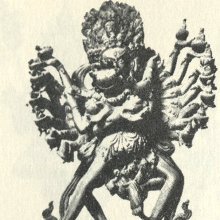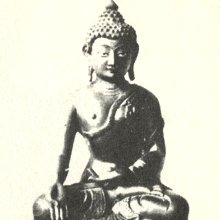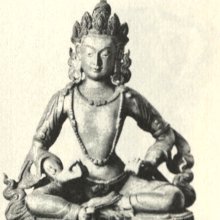O: 19 definitions
Introduction:
O means something in Hinduism, Sanskrit, the history of ancient India, Marathi, Jainism, Prakrit, Hindi, biology, Tamil. If you want to know the exact meaning, history, etymology or English translation of this term then check out the descriptions on this page. Add your comment or reference to a book if you want to contribute to this summary article.
Images (photo gallery)
(+1 more images available)
In Hinduism
Purana and Itihasa (epic history)
Source: archive.org: Puranic EncyclopediaO (ओ).—This sound signifies Brahmā. (Agni Purāṇa; Chapter 348).
Source: Cologne Digital Sanskrit Dictionaries: The Purana IndexO (ओ).—By protection;1 a yogi is said to be of Aumkāra.2

The Purana (पुराण, purāṇas) refers to Sanskrit literature preserving ancient India’s vast cultural history, including historical legends, religious ceremonies, various arts and sciences. The eighteen mahapuranas total over 400,000 shlokas (metrical couplets) and date to at least several centuries BCE.
Vyakarana (Sanskrit grammar)
Source: Wikisource: A dictionary of Sanskrit grammar1) O (ओ).—Diphthong vowel made up of the vowels अ (a) and उ (u), termed as guṇa in Pāṇini's grammar and prescribed sometimes in the place of the vowel उ;
2) O.—Affix ओ (o) applied to the root गम् (gam) or गा (gā) to form a noun; cf. ओकारो नामकरणः (okāro nāmakaraṇaḥ) Nir.II.5.

Vyakarana (व्याकरण, vyākaraṇa) refers to Sanskrit grammar and represents one of the six additional sciences (vedanga) to be studied along with the Vedas. Vyakarana concerns itself with the rules of Sanskrit grammar and linguistic analysis in order to establish the correct context of words and sentences.
India history and geography
Source: Cologne Digital Sanskrit Dictionaries: Indian Epigraphical GlossaryO.—d8iyā, spelt as Oriya in English; people, language and alphabet of Orissa. Note: o is defined in the “Indian epigraphical glossary” as it can be found on ancient inscriptions commonly written in Sanskrit, Prakrit or Dravidian languages.

The history of India traces the identification of countries, villages, towns and other regions of India, as well as mythology, zoology, royal dynasties, rulers, tribes, local festivities and traditions and regional languages. Ancient India enjoyed religious freedom and encourages the path of Dharma, a concept common to Buddhism, Hinduism, and Jainism.
Biology (plants and animals)
Source: Google Books: CRC World Dictionary (Regional names)O in Nigeria is the name of a plant defined with Sorghum bicolor in various botanical sources. This page contains potential references in Ayurveda, modern medicine, and other folk traditions or local practices It has the synonym Holcus durra Forssk. (among others).
Example references for further research on medicinal uses or toxicity (see latin names for full list):
· Descripción de las Plantas (1802)
· Observationes Botanicae (1781)
· Am. Journal of Botany (1757)
· Flora Aegyptiaco-Arabica (1775)
· Molecular Ecology (2143)
· Elenchus Plantarum Horti Regni Botanici Matritensis (1803)
If you are looking for specific details regarding O, for example side effects, health benefits, chemical composition, extract dosage, pregnancy safety, diet and recipes, have a look at these references.

This sections includes definitions from the five kingdoms of living things: Animals, Plants, Fungi, Protists and Monera. It will include both the official binomial nomenclature (scientific names usually in Latin) as well as regional spellings and variants.
Languages of India and abroad
Marathi-English dictionary
Source: DDSA: The Molesworth Marathi and English Dictionaryō (ओ).—
--- OR ---
ō (ओ).—The tenth vowel; corresponding with O in tone, lone. ōca ōḷakhaṇēṃ Used of a dolt who knows but one thing--has but one apprehension of whatsoever object or subject. 2 ōcyā nāvānēṃ pūja or ōcyā nā- vānēṃ śūnya kāḍhatāṃ (or ōcī gāṇḍa phōḍatāṃ) yēta nāhīṃ asā (That knows not how to frame the śūnya or gāṇḍa, the circular member of the letter ō or u0) A term for a dunce or dullard. 3 ō dēṇēṃ- daivānēṃ-karmānēṃ-prārabdhānēṃ To become propitious--Fortune:-- cōrānnī-bhutānnī-vāghānnī &c. To be exceedingly numerous or alert--thieves, demons &c., i.e. to answer to the call. 4 ō mhaṭalyāvara ṭhō (One that, if you utter ō, hears ṭhō) A term for a great dunce or blockhead. 5 ō yēī tōṃ paryanta (jēvaṇēṃ-khāṇēṃ &c.) Until nausea or satiety; usque ad nauseam.
--- OR ---
ō (ओ).—f Answer to a call. v dē. 2 (The sound in vomiting.) Vomiting. v yē. Ex. ō yēīparyanta jēvalā.
Source: DDSA: The Aryabhusan school dictionary, Marathi-Englishō (ओ).—The thirteenth vowel. f Answer to a call. Vomiting. ōcyā nāṃvānēṃ pūjya-śunya A term for a dunce. ō dēṇēṃ Answer to the call. ō yēī tōṃ ( khāṇēṃ ) Until nausea or satiety.
Marathi is an Indo-European language having over 70 million native speakers people in (predominantly) Maharashtra India. Marathi, like many other Indo-Aryan languages, evolved from early forms of Prakrit, which itself is a subset of Sanskrit, one of the most ancient languages of the world.
Sanskrit dictionary
Source: DDSA: The practical Sanskrit-English dictionaryO (ओ).—m. (auḥ) Name of Brahmā. ind.
1) A Vocative particle (oh).
2) An interjection of (1) calling; (hallo, ho); (2) remembrance; (3) compassion (ah !).
3) The number महापद्म (mahāpadma). cf. also ओर्वेधा ज्ञो ध्रुवोऽगस्त्यो गरुडोऽगोऽक्षयोऽसुरः । आखुः काणोऽथ मार्जारः साधुः सङ्गः पराशरः (orvedhā jño dhruvo'gastyo garuḍo'go'kṣayo'suraḥ | ākhuḥ kāṇo'tha mārjāraḥ sādhuḥ saṅgaḥ parāśaraḥ) || Enm.
Source: Cologne Digital Sanskrit Dictionaries: Edgerton Buddhist Hybrid Sanskrit DictionaryO (ओ).—(°-) : see also ava- for words with this initial. When the form with ava- is normal Sanskrit, the form with o- is sometimes omitted here; compare § 3.76.
Source: Cologne Digital Sanskrit Dictionaries: Shabda-Sagara Sanskrit-English DictionaryO (ओ).—The vowel O, and the thirteenth of the Nagari alphabet.
--- OR ---
O (ओ).—ind. 1. A vocative particle, (ho.) 2. An interjection of calling, (ho, hola.) 3. Of reminiscence, (ho, ah.) 4. Of compassionating, (ah, oh.)
--- OR ---
O (ओ).—m. (oḥ) Brahma.
Source: Cologne Digital Sanskrit Dictionaries: Cappeller Sanskrit-English DictionaryO (ओ).—= 1 ā + 2 u.
Source: Cologne Digital Sanskrit Dictionaries: Monier-Williams Sanskrit-English Dictionary1) O (ओ):—1. o the thirteenth vowel of the alphabet (corresponding to English o).
2) 2. o ind. an interjection, [cf. Lexicographers, esp. such as amarasiṃha, halāyudha, hemacandra, etc.]
3) a particle of addressing
4) calling
5) reminiscence
6) of compassion, [cf. Lexicographers, esp. such as amarasiṃha, halāyudha, hemacandra, etc.]
7) 3. o m. Name of Brahmā, [cf. Lexicographers, esp. such as amarasiṃha, halāyudha, hemacandra, etc.]
8) 4. o (ā-√u).
Source: Cologne Digital Sanskrit Dictionaries: Yates Sanskrit-English Dictionary1) O (ओ):—The 13th vowel or diphthong of the alphabet, o long.
2) interj. oh! ho!
3) (auḥ) 4. m. Brahmā.
[Sanskrit to German]
Sanskrit, also spelled संस्कृतम् (saṃskṛtam), is an ancient language of India commonly seen as the grandmother of the Indo-European language family (even English!). Closely allied with Prakrit and Pali, Sanskrit is more exhaustive in both grammar and terms and has the most extensive collection of literature in the world, greatly surpassing its sister-languages Greek and Latin.
Hindi dictionary
Source: DDSA: A practical Hindi-English dictionaryO (ओ):——the ninth vowel and the ninth letter of modern Devnagri: alphabet. (If [ṛ] & [lṛ] are to be taken into account, it becomes the eleventh); O !, a vocative particle.
...
Prakrit-English dictionary
Source: DDSA: Paia-sadda-mahannavo; a comprehensive Prakrit Hindi dictionaryO (ओ) in the Prakrit language is related to the Sanskrit word: Tas.
Prakrit is an ancient language closely associated with both Pali and Sanskrit. Jain literature is often composed in this language or sub-dialects, such as the Agamas and their commentaries which are written in Ardhamagadhi and Maharashtri Prakrit. The earliest extant texts can be dated to as early as the 4th century BCE although core portions might be older.
Kannada-English dictionary
Source: Alar: Kannada-English corpusO (ಒ):—[noun] the twelfth letter and the vowel of the alphabet.
--- OR ---
O (ಒ):—[interjection] an interjection used to express doubt, wonder, appreciation, etc.
--- OR ---
Ō (ಓ):—
1) [noun] the thirteenth letter and the thirteenth vowel of the alphabe.
2) [noun] ಓ ಎಂದರೆ ಠೋ ಎನ್ನಲು ಬಾರದಿರು [o emdare tho ennalu baradiru] ōebdare ṭhō ennalu bāradiru to be absolutely ignorant of letters; to be an illiterate.
--- OR ---
Ō (ಓ):—
1) [verb] to feel for; to love.
2) [verb] to bring up with care; to foster; to protect.
3) [verb] ಓತುಕೊಳ್ಳು [otukollu] ōtukoḷḷu to give parental care to; to foster.
4) [verb] to take into arms and press to the bosom to express one’s affection.
--- OR ---
Ō (ಓ):—[interjection] an interjection used to express doubt, wonder, appreciation, etc.
--- OR ---
Ō (ಓ):—[noun] a response to being called.
Kannada is a Dravidian language (as opposed to the Indo-European language family) mainly spoken in the southwestern region of India.
Tamil dictionary
Source: DDSA: University of Madras: Tamil LexiconO (ஒ) . Tenth letter and vowel of the Tamil alphabet, the half-close back lax unrounded vowel in Tamil; பத்தா முயிரெழுந்து. [patha muyirezhunthu.]
--- OR ---
O (ஒ) [ottal] 11 verb [Malayalam: okku.] transitive
1. To resemble; போலுதல். உறுப்பொத்தல் மக்களொப்பன் றால் [poluthal. uruppothal makkaloppan ral] (திருக்குறள் [thirukkural], 993).
2. To equal; சமமாதல். உயர் வொப்பில் லாதவர் [samamathal. uyar voppil lathavar] — intransitive
1. To be suited to; to be consistent with; to be appropriate; தகுதியாதல். ஒப்ப நாடி யத்தக வொறுத்தி [thaguthiyathal. oppa nadi yathaga voruthi] (புறநானூறு [purananuru] 10, 4).
2. To be acceptable; சம்மதமாதல். அவனுக்கு ஒத்த விஷ யம். [sammathamathal. avanukku otha visha yam.]
3. To be of good character; to be well-behaved; ஒழுக்கமுடையராதல். ஒப்பார்மற்றெனைவர் [ozhukkamudaiyarathal. opparmarrenaivar] (சீவகசிந்தாமணி [sivagasindamani] 1543).
4. To be harmonious, be in happy concord; ஒற்றுமைப்படுதல். எத்தால் வாழலாம், ஒத் தால் வாழலாம். [orrumaippaduthal. ethal vazhalam, oth thal vazhalam.]
5. To appear as if it were; இல் லாததொன்று இருந்தாற்போலுதல். கமலபாதம் வந் தென் கண்ணினுள்ளன வொக்கின்றதே [il lathathonru iruntharpoluthal. kamalapatham van then kanninullana vokkinrathe] (நாலாயிர திவ்யப்பிரபந்தம் அமலனாதி. [nalayira thivyappirapandam amalanathi.] 1).
--- OR ---
Ō (ஓ) The 11th vowel, lengthened grade of ஒ; பதினொராம் உயிரெழுத்து. [o; pathinoram uyirezhuthu.]
--- OR ---
Ō (ஓ) noun The symbol representing the sixth note of the gamut; விளரியென்னும் இசை யின் எழுத்து. (திவா.) [vilariyennum isai yin ezhuthu. (thiva.)]
--- OR ---
Ō (ஓ) noun
1. Going and staying; சென்று தங்குகை. ஓவற விமைக்கும் . . . ஒளி [senru thangugai. ovara vimaikkum . . . oli] (பத்துப்பாட்டு [pathuppattu] 3).
2. Shutter or other means to stop the flow of water; மதகுநீர்தாங்கும் பலகை. [mathagunirthangum palagai.] (தொல். எழுத். [thol. ezhuth.] 180, உரை. [urai.])
--- OR ---
Ō (ஓ) interjection
1. Oh! expressing superiority, as ஓஒ பெரியன் [oo periyan], or inferiority, as ஓஓ கொடியன்; உயர்விழிவுகளின் சிறப்புக்குறிப்பு. [oo kodiyan; uyarvizhivugalin sirappukkurippu.] (நன். [nan.] 423.)
2. Alas! ah! expressing bereavement; கழிவிரக்கக் குறிப்பு. ஓஒ தமக்கோ ருறுதி யுணராரோ [kazhivirakkag kurippu. oo thamakko ruruthi yunararo] (நன். [nan.]
423. விருத். [viruth.]).
3. Ha! expressing joy; மகிழ்ச்சிக்குறிப்பு. ஓபெரிதுவப்பக் கேட்டேன் [magizhchikkurippu. operithuvappag ketten] (சீவகசிந்தாமணி [sivagasindamani] 905).
4. Oho! expressing wonder; வியப்புக்குறிப்பு. முகந் திங் களோ காணீர் [viyappukkurippu. mugan thing kalo kanir] (சிலப்பதிகாரம் அரும்பதவுரை [silappathigaram arumbathavurai] 7, பாடல் [padal] 11).
5. O! expressing recollection; ஞாபகக்குறிப்பு. ஓ தெரிந்தது. [gnapagakkurippu. o therinthathu.]
6. Halloa! calling attention; அழைத்தற்குறிப்பு. ஓ மகனே [azhaitharkurippu. o magane]!
--- OR ---
Ō (ஓ) particle
1. Element signifying (a) ellipsis of a counterpart; ஒழியிசை. படித்தற் கோ வந்தான் [ozhiyisai. padithar ko vanthan]: (b) interrogation; வினா. அவனோ வந் தான் [vina. avano van than]?: (c) negation; எதிர்மறை. யானோ செய்வேன் [ethirmarai. yano seyven]?: (d) discrimination; தெரிநிலை. ஆணோ அதுவுமன்று, பெண்ணோ அதுவுமன்று [therinilai. ano athuvumanru, penno athuvumanru]: (e) distinctiveness; பிரி நிலை. அவனோ கொண்டான் [piri nilai. avano kondan]: (f) doubt; ஐயம். பத் தோ பதினொன்றோ. [aiyam. path tho pathinonro.]
2. Expletive; அசைநிலை. [asainilai.] (நன். [nan.] 423, விருத். [viruth.])
--- OR ---
Ō (ஓ) [ōttal] 11 transitive verb [K. ōḷ.] Lit., to be of one mind, transferred sense, to copulate; புணர்தல். (அகராதி நிகண்டு) [punarthal. (agarathi nigandu)]
--- OR ---
O (ஒ) noun (Astrology) Letter representing the peacock, in pañca-paṭci; பஞ்சபட்சிகளுள் மயிலைக் குறிக்கும் எழுத்து. (பிங்கலகண்டு) [panchapadsigalul mayilaig kurikkum ezhuthu. (pingalagandu)]
Tamil is an ancient language of India from the Dravidian family spoken by roughly 250 million people mainly in southern India and Sri Lanka.
See also (Relevant definitions)
Starts with (+7663): 'ol mo lung ring, Ahara Rupa, Crocodile oil, Edema, Fish oil, Hog oil, Knower of brahma, O la mase dmarpo, O luang, O nam, O nduy, O pequizeiro, O yai, O-ba-inu-biwa, O-ba-no-senna, O-bana-ariake-kazura, O-dein, O-enraveli, O-futo-momo, O-gochyo.
Ends with (+9980): A anwo, A ka ru nag po, A las quatro, A lontho, A mara and sin pa ko, A mra and sin bra ko, A-kimbo, A-nekedo, A-nekodo, A-thotho, Aafuscdo, Aagbado, Aagijaado, Aakadio, Aakadiyo, Aakdo, Aakro, Aaku pero, Aalokancho, Aaloo.
Full-text (+11347): Ao, Okara, Omiti, O-ka-tho-na-karatam-yenem, Ao-sango, Ao-tsuzura-fuji, Wu yeh p'ao, Ao tou xian, Ao zhou qie, Hung th'ao, Chieh hsu ts'ao, Ao ye qiu lan, Iso-yama-ao-ki, Ao-ki, Ao chun jiang, K'un lun ts'ao, Ao ye shan ma huang, O-vaypanai, Yuan ye ao yang, Hsien jen ts'ao.
Relevant text
One of your search terms exceeds the minimun character amount per search term. This amount currently equals 2.
No search results for O, Ō, Ao in any book or story.
Related products
(+16 more products available)











